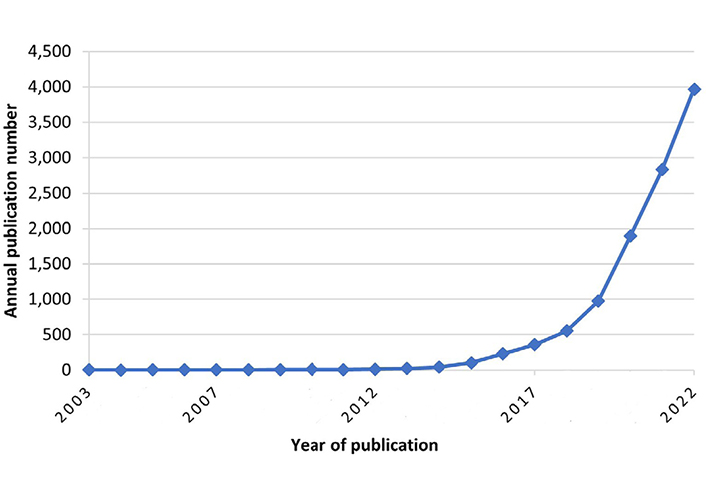Affiliation:
1Ludwig Boltzmann Institute Digital Health and Patient Safety, Medical University of Vienna, 1090 Vienna, Austria
2Institute of Genetics and Animal Biotechnology of the Polish Academy of Sciences, 05-552 Magdalenka, Poland
Email: Atanas.Atanasov@dhps.lbg.ac.at
ORCID: https://orcid.org/0000-0003-2545-0967
Explor Digit Health Technol. 2023;1:1–3 DOI: https://doi.org/10.37349/edht.2023.00001
Received: February 05, 2023 Accepted: February 06, 2023 Published: November 01, 2023
Academic Editor: Atanas G. Atanasov, Medical University of Vienna, Austria
Exploration of Digital Health Technologies is a new peer-reviewed open access online journal by Open Exploration Publishing. Biomedical applications of digital technologies represent an area with great sector-transformative potential [1]. The explosive growth of research interest in the area of digital health is presented in Figure 1, illustrating that in the last ten years, the annual number of publications featuring “digital health” in PubMed went from a single-digit number to around 4,000 publications per year. Thus, the area is exceptionally dynamic, and continuous scientific explorations in its scientific domain will be of key significance for the realization of its healthcare-transformative potential.

Annual publication numbers yielded through “digital health” PubMed query for the period 2003–2022
By accepting the Editor-in-Chief position of the new journal, my goal is set to contribute towards the establishment of a premium-quality publishing platform aiming to attract the highest-quality scientific contributions from around the world covering all aspects related to applications of digital technologies in healthcare and the broader biomedical domain. A diversity of article types will be published by the journal, including Original Articles, Reviews, Meta-Analyses, Systematic Reviews, Case Reports, Protocols, Commentaries, Perspectives, Editorials, and Letters to the Editor. Moreover, to reflect impactful developments in the broad scientific area related to digital health technologies, published articles will be based both on traditionally regarded as key digital health areas such as telehealth or research based on electronic patient records, but also on digital applications in the more broad biomedical research domain with relevance to the digitalization of healthcare, for example, social media research with relevance to health and medicine [2], applications of three-dimensional (3D) printing technologies in healthcare [3], use of digital technologies in medical education [4], or research on websites with relevance to public health communication [5], among others.
Digital health technologies are set to bring benefits to many healthcare areas. Such technologies can enable rapid access to health services for patients in remote areas, facilitate medical information storage and easy retrieval, support better follow-up and clinical decision-making, as well as promote better patient adherence to therapies [6]. Moreover, digitalization is a key driver for the implementation of personalized medicine (a highly promising innovative healthcare approach aiming at tailoring therapies to account for individual genetic and lifestyle differences among patients) by enabling analysis and integration of diverse patient-specific “big data” that can be originating, for example, from omics profiling, electronic patient record data, and vital parameters records collected through wearable biosensors [7]. However, important challenges remain for the implementation of digital technologies in healthcare, some of which are insufficient digital health literacy of patients and healthcare workers, insufficient validation of clinical effectiveness and quality of new digital technologies, high costs, compatibility of different technologies with each other, and patient data privacy and security concerns [6, 8]. Taking into consideration the hindering role of such remaining challenges for the implementation of digital health applications in the practice, research works looking into ways to address them will be especially welcome to be submitted to Exploration of Digital Health Technologies.
Assuring the success of Exploration of Digital Health Technologies leans on: (1) quality; (2) visibility; (3) speed; (4) absence of costs.
In more detail, high-quality standards will be assured by the expert editorial board including multiple leading scientists from diverse areas with relevance to digital health technologies. Moreover, to attract the best manuscripts, diverse incentives will be offered to authors and editors, including “most cited paper awards”, among others. Aside from the excellence of the editorial board and published articles, the high visibility of the journal will be assured by the open access publishing model and outstanding social media presence (including the application of the dedicated hashtag #ExplorDHT, which would be used for featuring manuscripts and journal-specific developments to achieve better online discoverability on both search engines such as Google, as well as on social media platforms like Twitter or LinkedIn). A further factor that will be applied to make the journal more attractive to authors is the speed of handling of submitted manuscripts, which, however, will be also combined with a highly qualitative peer-review process that will benefit the authors to rapidly receive expert peer-reviewers’ feedback including quality-improvement recommendations. Last but not least, despite the open access publishing model, the journal will offer to authors the chance to publish their articles free of charge.
The outlined reliance on editorial excellence, rapid and qualitative peer-review, speed of manuscript handling, utilization of diversity of visibility-promoting strategies, and incentive strategies such as competitive awards and absence of fees for authors, will assure a bright future for the journal and afford it to become a premium-platform for the communication of scientific concepts and new research findings in the rapidly developing area of digital health technologies.
The author contributed solely to the paper.
Author Atanas G. Atanasov is the Editor-in-Chief of Exploration of Digital Health Technologies, but he had no involvement in the peer-review of this article and had no access to information regarding its peer-review.
Not applicable.
Not applicable.
Not applicable.
Not applicable.
Not applicable.
© The Author(s) 2023.
Copyright: © The Author(s) 2023. This is an Open Access article licensed under a Creative Commons Attribution 4.0 International License (https://creativecommons.org/licenses/by/4.0/), which permits unrestricted use, sharing, adaptation, distribution and reproduction in any medium or format, for any purpose, even commercially, as long as you give appropriate credit to the original author(s) and the source, provide a link to the Creative Commons license, and indicate if changes were made.
